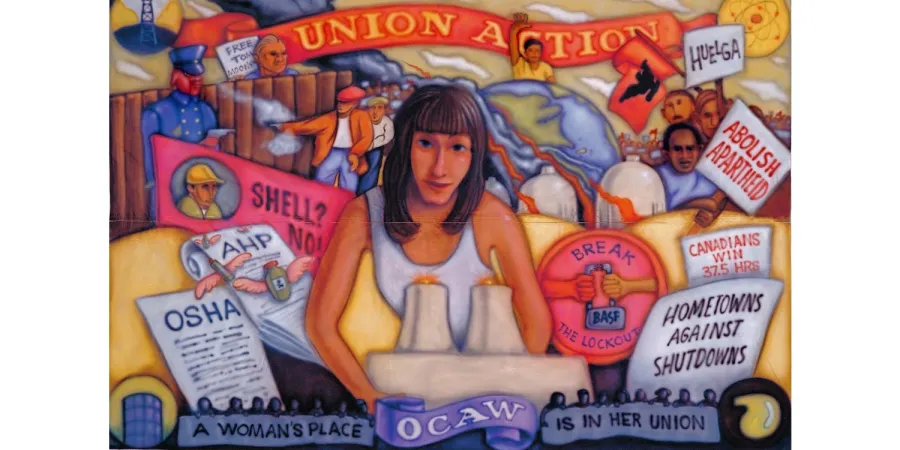Karen Silkwood, 1946-1974

“Karen Silkwood was a union martyr. Her experience was not that unusual in the trade union movement, except that she ultimately died for her cause. We must remember her story.” – Tony Mazzocchi
There are many role models for women activists. While some have become household names, not all of our heroes are famous. Our union sister, Karen Silkwood, is known for her untimely death, but it is her activism that we honor.
Karen Silkwood was a member of the Oil, Chemical and Atomic Workers International Union (OCAW) Local 5-283 when she was killed 50 years ago on Nov. 13, 1974. She is remembered for her courage, commitment and strength as a union member and whistleblower. A hero of the worker safety and health movement, Karen was first and foremost an activist defending her local union.
Her story started out like many others – just going to work to earn a living for herself and her kids. Her employer, Kerr McGee Company in Cimarron, Okla., had broken a strike by the local union several years before. Located in Okla., a “right-to-work” state, the company seized the opportunity to instigate a decertification campaign. The union lost a lot of support during the strike and was down to 20 members out of 150 eligible workers.
The decertification election was only a few months away in September 1974 when Karen was elected as the first woman on the bargaining committee in Kerr McGee’s history. Her main assignment was to work on health and safety issues. While she had concerns about plant safety, she was not aware of the extent of the cancer risk from working with plutonium. She had only been at the plant for two years and was unaware of some of the less obvious dangers of working at the plant.
The OCAW’s leadership was committed to supporting the efforts to save the union and improve conditions for its members. In September 1974 Karen and the other two members of the bargaining committee flew to Washington D.C., to meet with Tony Mazzocchi. Tony was the union’s legislative director, but this meeting was to plan a strategy to fight the decertification efforts.
It was at the meeting in Washington that she learned about plutonium and cancer. She was angry both on behalf of her coworkers and because she herself had been exposed. Together the committee decided that health and safety would be a key element in the union’s campaign to remain the workers’ representative.
Workers care about their safety. This was proven in the victory against decertification. Even though only 20 people belonged to the union at the beginning of the campaign, they won the decertification vote by 80-61. This is one more example of how meaningful it is to people when the union steps up to defend workers’ rights to a safe and healthy workplace.
Karen’s fight did not end with the victory against decertification. The information Karen had found while researching the plutonium issues had the potential to contaminate both workers at the plant and the public. Her research uncovered evidence that the company was altering inspection records of the plutonium fuel rods used in nuclear reactors. Using defective rods could be catastrophic.
The union knew that fighting the company required that this information receive wider public scrutiny than just the plant safety committee. The OCAW International arranged for Karen to provide documentation to an investigative reporter from the New York Times.
On Nov. 13, 1974, Karen was driving from Crescent, Okla., to Oklahoma City to deliver the documents to the reporter. Her car ran off the road and she was killed. The documents were never found.
Her death spurred an investigation into the Kerr-McGee plant.
The Silkwood family eventually won a multi-million-dollar lawsuit against the company.
Karen Silkwood should not be honored and remembered solely because of her death. It was her life and her life’s work that should inspire all of us. As Mazzocchi said in his remembrance of Karen, “We must remember her story because it is a symbol of the collective efforts and courage of the millions of trade unionists who have fought, and still fight, to defend the health, safety, and security of their fellow workers.”
Read Tony Mazzocchi’s remembrance of Karen Silkwood.
The USW also has a webpage dedicated to the Karen Silkwood Story.
The USWTMC has a banner which reflects the well-known mural of Karen Silkwood titled “Remembering Karen Silkwood” by Mike Alewitz. A picture of the mural is included in this reflection; however, you can learn more about it and see it in detail here.